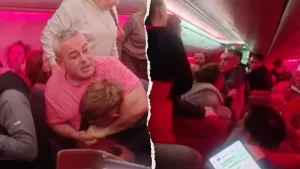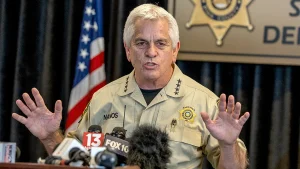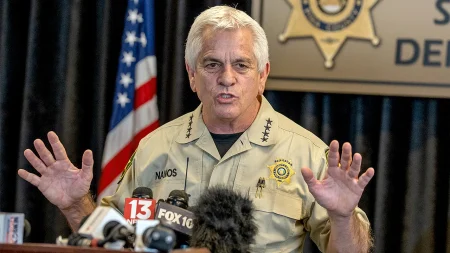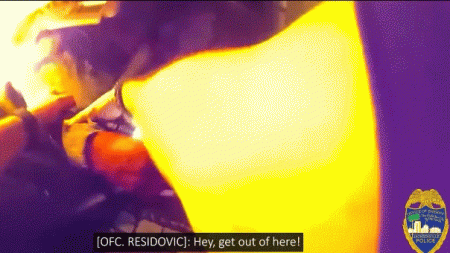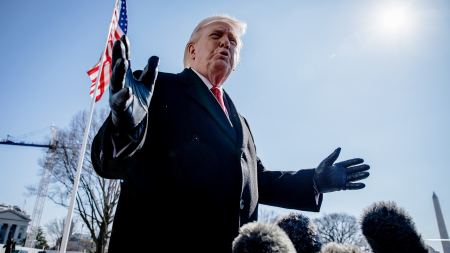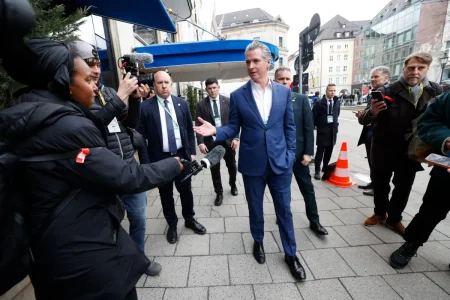Cuban Dissident José Daniel Ferrer Finds Freedom After Years of Brutal Imprisonment
A Voice Silenced but Never Broken: Prominent Cuban Opposition Leader Reaches U.S. Soil
In a significant development that highlights the ongoing human rights struggles in Cuba, prominent dissident José Daniel Ferrer arrived in Miami on Sunday after enduring years of harsh imprisonment and systematic persecution by the Cuban regime. Ferrer, one of the island’s most recognized opposition figures, described his confinement conditions as being “buried alive,” painting a harrowing picture of the Cuban government’s treatment of political prisoners. His release and subsequent journey to the United States marks a rare diplomatic breakthrough in an otherwise tense relationship between Washington and Havana, while simultaneously underscoring the continuing repression faced by those who dare to challenge Cuba’s authoritarian system.
The 53-year-old activist’s arrival was confirmed by Secretary of State Marco Rubio, who welcomed him to American soil via social media, describing the moment as a significant victory for human rights advocacy. Ferrer, who founded the Patriotic Union of Cuba (UNPACU), one of the largest opposition groups on the island, has been a persistent thorn in the side of Cuban authorities for decades. His release comes after intense international pressure from human rights organizations, the U.S. government, and exile communities who have long campaigned for his freedom. For many observers of Cuban politics, Ferrer’s case exemplifies the regime’s unrelenting approach toward silencing dissent – an approach that combines lengthy detentions, psychological torture, and isolation to break the spirit of those who advocate for democratic change.
The Brutal Reality of Political Imprisonment in Cuba
During a press conference held shortly after his arrival, Ferrer provided disturbing details about his imprisonment conditions that shocked even seasoned human rights advocates. “Imagine being entombed in complete darkness, where days and nights blend into a timeless void,” he explained, his voice occasionally breaking as he recounted his experience. The dissident described being held in solitary confinement for stretches lasting months, in cells barely large enough to lie down, with minimal access to sunlight or fresh air. These conditions, recognized internationally as forms of torture when prolonged, left Ferrer suffering from various health complications including severe vision problems, nutritional deficiencies, and psychological trauma.
Perhaps most disturbing were Ferrer’s allegations regarding the deliberate withholding of medical care – a tactic he claims is systematically employed against political prisoners. “They use your health as a weapon,” he stated, describing how authorities would ignore serious medical conditions or offer treatment only in exchange for political compliance or confessions. Independent human rights organizations have corroborated such claims, documenting patterns of medical neglect in Cuban prisons, particularly for those incarcerated for political reasons. According to reports from Prisoners Defenders and Human Rights Watch, dozens of political prisoners in Cuba currently face similar conditions, with many suffering from deteriorating health without adequate medical attention. The systematic nature of this treatment, experts argue, constitutes a deliberate state policy designed to crush opposition through physical and psychological breakdown rather than merely addressing individual cases of dissent.
From Activist to International Symbol of Resistance
Ferrer’s journey to becoming one of Cuba’s most prominent dissidents began long before his recent imprisonment. As a young man in eastern Cuba during the 1990s, he became involved in early efforts to challenge the one-party system, eventually becoming a key figure in the “Cuban Spring” of 2003. That year, he was among 75 activists arrested in a sweeping crackdown known as the “Black Spring,” receiving a 25-year sentence. Released in 2011 as part of an agreement brokered by the Catholic Church and the Spanish government, Ferrer refused exile – a condition accepted by many of his colleagues – choosing instead to remain in Cuba and establish UNPACU.
The organization quickly grew to become one of the most effective opposition groups on the island, employing nonviolent resistance strategies and documentation of human rights abuses to challenge the regime. This effectiveness made Ferrer a primary target for authorities, resulting in dozens of short-term detentions before his most recent, prolonged imprisonment beginning in 2019. Throughout these ordeals, his family reported systematic harassment, surveillance, and intimidation – tactics that extended beyond Ferrer himself to create pressure on his entire support network. International human rights defenders have noted this pattern of targeting not just prominent figures but also their families and associates as a particularly insidious form of repression designed to isolate dissidents and discourage others from joining opposition movements. Despite these pressures, Ferrer’s resolve appeared undiminished during his first public appearance in Miami, where he pledged to continue advocating for democratic change in Cuba, though now from exile.
Diplomatic Breakthrough or Calculated Strategy?
The circumstances surrounding Ferrer’s release remain somewhat unclear, with neither the Cuban government nor U.S. officials providing comprehensive details about the negotiations that led to his freedom. Analysts specializing in U.S.-Cuba relations suggest this development likely represents a calculated diplomatic maneuver by the Cuban government rather than a fundamental shift in its approach to political opposition. “The timing is significant,” noted Dr. Maria Fernandez, a professor of international relations specializing in Cuban politics at Georgetown University. “The Cuban regime has historically released high-profile prisoners during periods of extreme economic distress or when seeking specific concessions from Washington.”
Indeed, Cuba currently faces its worst economic crisis in decades, with widespread food shortages, medicine scarcity, and power outages fueling unprecedented emigration levels. Some experts speculate that Ferrer’s release may be part of a broader strategy to ease diplomatic tensions and potentially pave the way for economic relief measures from the United States. Others view it as an attempt to remove influential opposition figures from the island, thereby weakening internal resistance movements. Either interpretation suggests the Cuban government remains committed to its fundamental approach toward political dissent, even while making tactical concessions in individual cases that generate significant international attention. This pattern has historical precedent, with Cuban authorities periodically releasing prominent prisoners into exile while maintaining or even intensifying repression against less visible activists remaining on the island.
A Voice for Those Left Behind
During his first hours on American soil, Ferrer emphasized that his thoughts remained with fellow activists still imprisoned in Cuba. “My freedom means nothing if we forget those still suffering in silence,” he stated, naming several colleagues including Luis Manuel Otero Alcántara, Maykel Castillo, and dozens of others detained following the historic July 11, 2021 protests. These demonstrations, the largest in Cuba in decades, led to hundreds of arrests and harsh sentences that human rights organizations have condemned as disproportionate and politically motivated. The handling of these cases represents what many observers describe as an intensification of repression under President Miguel Díaz-Canel, who succeeded Raúl Castro in 2018.
Ferrer’s advocacy from exile now joins a chorus of voices in the Cuban diaspora working to maintain international attention on human rights conditions within the island. His personal testimony adds powerful firsthand evidence to ongoing documentation efforts by organizations like Amnesty International and the Inter-American Commission on Human Rights. “The world must understand that what happened to me is not exceptional but systematic,” Ferrer explained, emphasizing that his experience reflects broader patterns of state repression rather than isolated incidents. As he begins rebuilding his life in Miami, home to the largest Cuban exile community in the world, Ferrer has pledged to leverage his newfound freedom and international platform to advocate for those unable to speak freely. His case highlights the complex reality of political opposition in Cuba – where moments of apparent progress often mask deeper, structural repression that continues to constrain fundamental freedoms for the island’s 11 million citizens, even as the world’s attention momentarily celebrates individual victories like Ferrer’s release.
